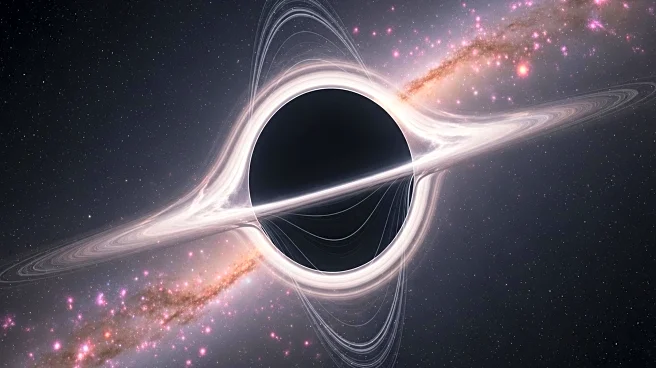What's Happening?
Astronomers have identified an extremely faint, low-mass object in the distant universe, which may be composed of dark matter. This discovery was made using gravitational lensing, a technique that measures the effect of an object's gravity on light passing around it. The object is so small that it caused a slight distortion on the gravitational lens of a distant galaxy. The research, published in Nature Astronomy, involved combining the capabilities of several observatories to create an Earth-sized telescope sensitive enough to detect such a small object. The team, including Chris Fassnacht from the University of California, Davis, suggests this could be the lowest-mass dark object ever found, although its exact nature remains unknown.
Why It's Important?
The discovery is significant as it could provide insights into the nature of dark matter, which constitutes approximately 27% of the universe's mass. Dark matter is crucial for understanding the structure and behavior of galaxies and galaxy clusters, yet it remains invisible and is detected only through its gravitational effects. If the object is indeed composed of dark matter, it would be 100 times smaller than any previously detected clump of dark matter, supporting the cold dark matter theory. This theory posits that dark matter consists of slow-moving particles that clump together due to gravity. The findings could lead to further discoveries and help refine existing models of dark matter distribution in the universe.
What's Next?
Researchers aim to identify more such objects to determine if their numbers align with current models of dark matter. The study's lead author, Devon Powell from the Max Planck Institute for Astrophysics, notes the importance of finding additional objects to validate the models. Future observations and studies will focus on detecting more low-mass objects and understanding their implications for dark matter theories. This could potentially lead to breakthroughs in cosmology and a deeper understanding of the universe's composition.
Beyond the Headlines
The discovery raises questions about the fundamental nature of dark matter and its role in cosmic evolution. It challenges scientists to explore new methods of detection and analysis, potentially leading to advancements in observational astronomy. The ethical dimension involves the pursuit of knowledge about the universe, which could redefine humanity's understanding of its place in the cosmos.









